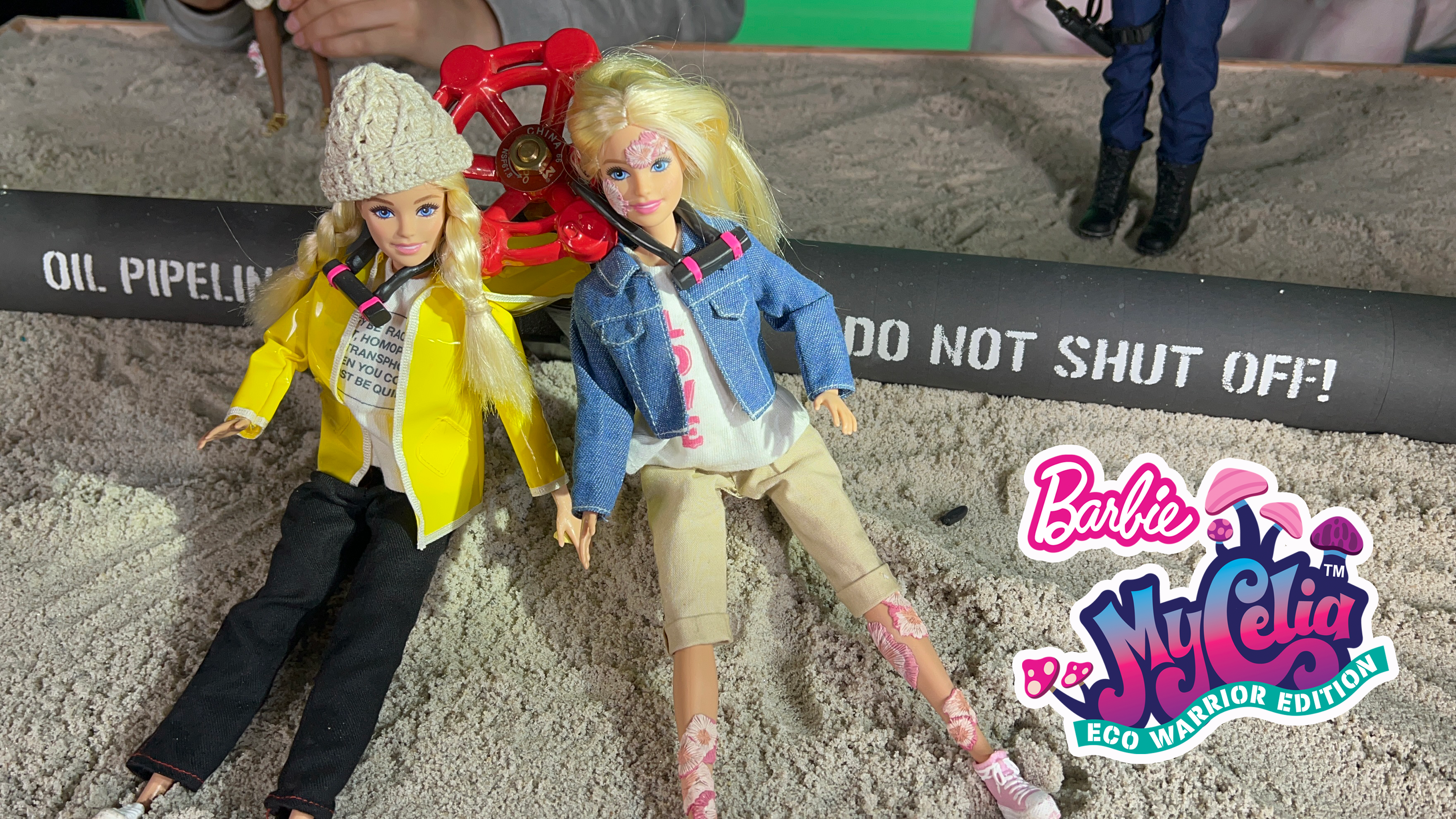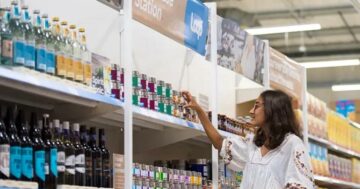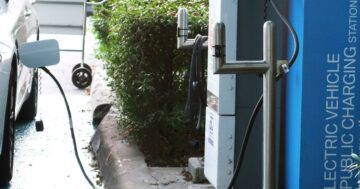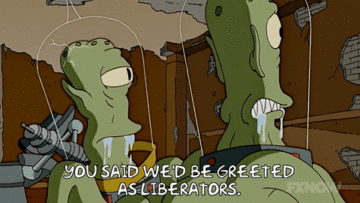What could have been a giant breakthrough in eliminating plastic waste was revealed Tuesday as an elaborate hoax involving the buzziest company of the moment, Mattel, and a fake endorsement video featuring actress Daryl Hannah.
Building on the success and meta-discourse created by the blockbuster “Barbie” movie, eco-activist agency Yes Men created a press release written to look as if it were from Mattel, announcing the toy company would go plastic-free by 2030. The release was shared by someone posing as a Mattel spokesperson and distributed to journalists via spoofed email addresses and websites.
The statement included audacious quotes attributed to top Mattel executives such as “we denounce the empty promises of plastic recycling and take a bold step towards real ecological sustainability,” and, “we realized the Mattel’s previous commitment to the use of 100 percent recycled plastic by 2030 would only serve to delay the release of plastic into the environment.”
After the release was revealed as a hoax, Igor Vamos and Jacques Servin from Yes Men (better known as their activist alter egos, Mike Bonanno and Andy Bichlbaum) called reporters along with Hannah, calling themselves the Barbie Liberation Organization.
During that interview, Vamos confirmed Yes Men was behind both the original email announcing the plastic-free commitment and the subsequent one revealing it as a hoax. Both statements were made to look as if they came from Mattel Corporate.
A Mattel spokesperson confirmed via email that the entire stunt was a hoax and the company was not involved.

The fake announcement also included the “launch” of a fictitious new set of MyCelia EcoWarrior Barbies that includes likenesses of ecoactivist actress Daryl Hannah, oil pipeline protester Phoebe Plummer, Indigenous activist Nemonte Nenquimo, Swedish environmental activist Greta Thunberg and Julia Butterfly, who lived in a California redwood tree for 783 days in 1997 and 1998. The pledge was to make these dolls from mushroom mycelium, algae, seaweed, clays, wood cellulose and bamboo that will fully decompose.
“They took a chance in remodeling the Barbie and putting her in different body style shapes,” Hannah said in an interview with GreenBiz. “I’m hoping [Mattel] will also realize that if they want to be serious about sustainability, then they should try to reorient their sustainability mission into true compostable and biodegradable alternatives.”
The real Mattel launched a collection of Barbies last year called the Eco-Leadership Team including chief sustainability officer and primatologist Jane Goodall editions. Those dolls are made mostly from recycled plastic.
Mattel’s actual sustainability goals include 100 percent recycled, recyclable or bio-based plastic materials in its products and packaging by 2030; and reducing plastic packaging by 25 percent per product by 2030 (versus a 2020 baseline).
Most plastic commitments have focused on single-use plastics and plastic packaging, not durable plastic goods. Lego, another big name in the plastic toy space, has been out front with a pledge to remove single-use plastic from its packaging. It is also working with the Bioplastic Feedstock Alliance to explore other materials for its signature products.
Erin Simon, vice president and head of plastic waste and business at the World Wildlife Fund, said addressing single-use plastic is just the start, and this stunt shows where the conversation is going.
“The focus has been primarily on where [plastic] ends up,” she said. “But to really stem the tide of plastic entering the oceans … you have to reduce what you make in the first place. The poster child for it right now is single-use plastics. But the more that awareness is raised, and the more policies that go into effect, the more investment into it, the sphere of influence of those changes. It’s going to grow [towards durable plastics]. So while probably not a real goal [for Mattel] at the moment, they could think about what it could mean in the future.”
- SEO Powered Content & PR Distribution. Get Amplified Today.
- PlatoData.Network Vertical Generative Ai. Empower Yourself. Access Here.
- PlatoAiStream. Web3 Intelligence. Knowledge Amplified. Access Here.
- PlatoESG. Automotive / EVs, Carbon, CleanTech, Energy, Environment, Solar, Waste Management. Access Here.
- BlockOffsets. Modernizing Environmental Offset Ownership. Access Here.
- Source: https://www.greenbiz.com/article/plastic-free-daryl-hannah-barbie-not-real
- :has
- :is
- :not
- :where
- $UP
- 100
- 1998
- 2020
- 2030
- 25
- a
- About
- Activist
- actress
- actual
- addresses
- addressing
- agency
- along
- also
- alternatives
- an
- and
- Announcement
- Announcing
- Another
- ARE
- AS
- At
- audacious
- awareness
- Bamboo
- Baseline
- BE
- been
- behind
- Better
- Big
- blockbuster
- body
- bold
- both
- breakthrough
- business
- but
- by
- california
- called
- calling
- came
- Center
- Chance
- Changes
- chief
- child
- collection
- commitment
- commitments
- company
- CONFIRMED
- Conversation
- Corporate
- could
- created
- Days
- delay
- different
- distributed
- Ecological
- effect
- Elaborate
- eliminating
- ends
- entering
- Entire
- Environment
- environmental
- Ether (ETH)
- executives
- explore
- fake
- Featuring
- First
- Focus
- focused
- For
- from
- front
- fully
- fund
- future
- giant
- Go
- goal
- going
- Goodall
- goods
- Grow
- Have
- head
- her
- hoping
- HTTPS
- if
- in
- include
- included
- includes
- Including
- influence
- Interview
- into
- investment
- involved
- involving
- IT
- ITS
- jane
- Journalists
- just
- known
- Last
- Last Year
- launch
- liberation
- Look
- made
- make
- materials
- mean
- Men
- mike
- Mission
- moment
- more
- mostly
- movie
- Mycelium
- name
- New
- now
- oceans
- of
- Officer
- Oil
- on
- ONE
- only
- or
- organization
- original
- Other
- out
- packaging
- per
- percent
- pipeline
- Place
- plastic
- plastics
- plato
- Plato Data Intelligence
- PlatoData
- Pledge
- policies
- president
- press
- previous
- primarily
- probably
- Product
- Products
- promises
- Putting
- quotes
- raised
- real
- realize
- realized
- really
- recycling
- reduce
- reducing
- release
- Revealed
- revealing
- right
- Said
- serious
- serve
- set
- shapes
- shared
- she
- should
- Shows
- signature
- Simon
- So
- Someone
- Space
- spokesperson
- start
- Statement
- statements
- Stem
- Step
- style
- subsequent
- success
- such
- Sustainability
- Swedish
- Take
- team
- that
- The
- The Future
- the world
- their
- themselves
- then
- These
- they
- Think
- this
- those
- Tide
- to
- took
- top
- towards
- toy
- tree
- true
- try
- Tuesday
- use
- Versus
- via
- vice
- Vice President
- Video
- want
- was
- Waste
- we
- websites
- were
- What
- while
- WHO
- Wildlife
- will
- with
- wood
- working
- world
- would
- written
- year
- yes
- you
- zephyrnet










